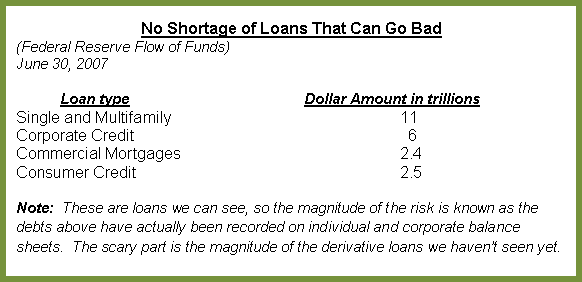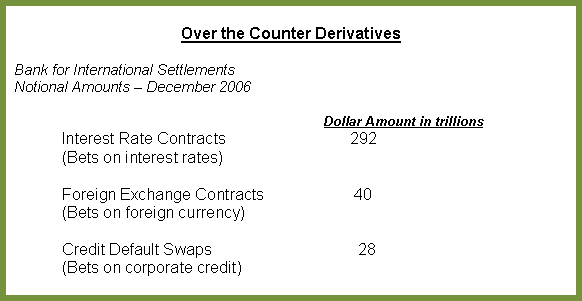WHEN CRUMBLING CREDIT MEETS DEADLY LEVERAGE
Written and published by Richard Benson, www.sfgroup.org
October 26, 2007
If our country's debt problems in the private sector were simplylimited to the $1.5 trillion of subprime mortgages that needed to berepaid, restructured or foreclosed, the situation might be manageable.But they're not, and it isn't. It's widely understood now that thismess was caused by a Federal Reserve that pumped up home ownership (foreveryone in America) and then proceeded to cut interest rates too lowfor too long, and by credit market participants who threw common senseand basic loan underwriting to the wind.
In looking back at this era of easy lending, the orgy waseffectively facilitated by Wall Street's ability to irresponsiblyunderwrite loans and then look the other way. Risky mortgage securitieswere packaged and sold in the secondary market to suckers who boughtinto the theory that the housing market would only go up.
As equity extraction becomes a thing of the past, a recession seemsinevitable. I predict there will be continued credit surprises - mostlyon the downside - as employment weakens, jobs are lost, and bills gounpaid. As a consumer-led recession unfolds, personal income andcorporate revenues won't cover many debts, and the game of always beingable to refinance has ended. So, for many borrowers the game is alreadyover; they just don't know it yet.
The credit cycle has clearly turned. Financial institutions, such asbanks, have only begun to add to the massive loan loss reserves they'llneed to shelter from the storm of at least $2 trillion of consumer,commercial real estate, corporate, and single family mortgage loans,that could easily roll over into default. And that's not all. Loan lossreserves are also being set aside as banks brace for the stress thathas begun to appear in commercial mortgages and mortgage securities.See the chart below:

In the world of easy money and the exponential increase ofartificial liquidity and credit, there is also the "shadow world" ofderivatives.
A derivative allows a market participant to make money or hedge aposition as if they owned a financial instrument, yet they're notrequired to put the asset on-balance sheet (or post the capital) thesame way they would have to if the asset were on-balance sheet.
Why is this important? As Hank Paulson, Secretary of the Treasury,runs around trying to bail out the Structured Investment Vehicles("SIVs"), it's become pretty obvious. These SIVs provided a way forhuge banks, like Citibank, to hold another $400 billion of assets butconveniently keep them off-balance sheet. Up until a few weeks ago, thefinancial press hadn't even heard of a SIV. Now, suddenly, they'rethreatening the core of the financial system because the loans mighthave to go back on-balance sheet and tie up precious equity capital!
The big players love derivatives because they allow massiveoff-balance sheet leverage. However, the hedge funds and mortgagecompanies that have all blown up recently (along with some Wall Streetfirms and Bear Stearns) have learned a hard lesson: mixing massivecredit losses with high leverage is a formula for quick and definitivefinancial death. While leverage may be positive to the bottom line onthe upside, it can quickly kill on the downside.
While SIVs are continuing to rock the system, they are a mererounding error compared to Credit Default Swaps ("CDSs") and othermajor derivatives. (CDSs are the most widely traded credit product.)See the Table below:

$28 trillion of CDSs is a staggering number! It's more than doublethe U.S. GDP, and is more than four times the total of all outstandingcorporate debt. The off-balance sheet "shadow world" of credit actuallydwarfs the on-balance sheet visible world.
"There is a lot of gamboling going on here in River City".
In real speak this means the financial players reap all of thebenefits on the upside, while the investors assume most of the risk onthe downside. The "gamboling" going on is off-balance sheet and, therefore, hidden from the investor's view.
In July and August we all learned how cruel the markets can be. Whenthe market value (gain to one party, and loss to the other) ofmortgages and mortgage derivatives spiked in value very quickly, quitea number of firms, and funds, simply failed. It was very sudden.Derivatives are by design extraordinarily leveraged, so small changesin the financial markets can affect their value in a big way. A sizablewave in the financial markets can easily be magnified and turned into atsunami of market losses. With the current level of credit derivativesall sitting off-balance sheet (and unnoticed like the SIV's recentlywere), unsuspecting investors could wake up to discover more alarminglosses amounting to a few trillion dollars that were neitheranticipated nor welcome.
Finally, the financial institutions that have exposure to on-balancesheet credit risk are the Who's Who of major hedge funds, major banks,and Wall Street investment banks. Guess who the major counterpartiesare in the derivatives market? Why, they're the same major players! So,while Bear Stearns has become the poster boy for all that's wrong withsubprime mortgages, don't worry. Other firms like JP Morgan Chase,Morgan Stanley, Citibank, Merrill Lynch, and even Goldman Sachs, mayhave their pictures posted alongside Bear Stearns' in the "Hall ofShame" when corporate credits turn down. Crumbling credit combined with deadly leverage can prove fatal to portfolios invested in financial stocks.
President
Specialty Finance Group LLC
Member NASD/SIPC
800-860-2907
www.sfgroup.org
Richard Benson, SFGroup, is a widely published authoron securitization and specialty finance, and a sought after speaker atfinancing conferences on raising equity for mid-market companies.
Prior to founding the Specialty Finance Group in1989, Mr. Benson acted as a trading desk economist for Chase ManhattanBank in the early 1980's and started in the securitization business in1983 at Bear Stearns, and helped build the early securitizationbusinesses at Citibank and E.F. Hutton.
Mr. Benson graduated from the University ofWisconsin in 1970 in the Honors Program in Math, and did his doctoralwork in Economics at Harvard University. Mr. Benson is a member of theHarvard Club of New York and Palm Beach.
The Specialty Finance Group, LLC is a Florida Limited Liability Company and is registered with the NASD/SIPC as a Broker/Dealer.




